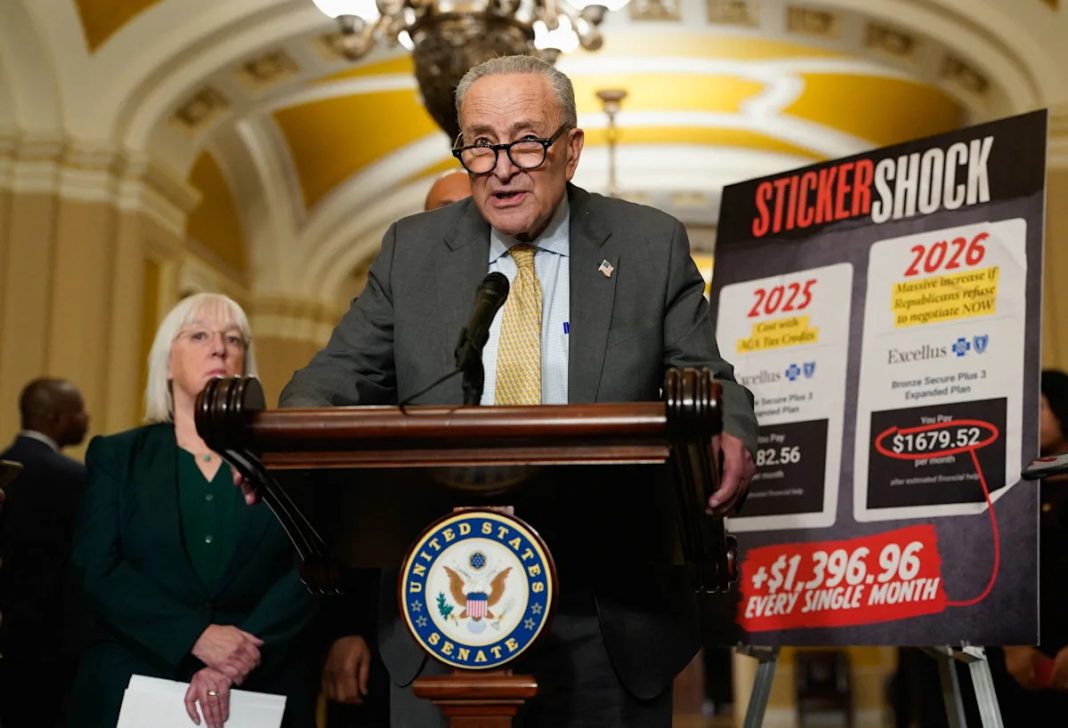what’s at stake
At the center of the impasse over US government funding are expiring Affordable Care Act subsidies passed at the height of the COVID pandemic.
Congress initially expanded the insurance premium tax credits in 2021 to lower out-of-pocket health care costs, increasing assistance available to those eligible while expanding the pool of people who qualify by lifting the income cap.
Those enhanced credits are slated to expire at the end of this year absent action by Congress, with estimates predicting that premium payments for ACA plan participants could more than double as a result.
Senate Democrats are demanding a deal to address the subsidies as part of any government funding measure, while Republicans say that Congress should end the shutdown and then have a conversation about the future of the credits.
who’s making the case
Sen. Richard Blumenthal, D-Conn., argued that the subsidies should be extended as they exist today, with no major changes:
“I think they should be extended permanently. Obviously, if we had to insert some superficially acceptable provision like, undocumented immigrants can’t benefit from this program — that’s the law right now, but they [Republicans] have this myth. So, OK, we’ll have this prohibition. We’ll say it twice. Or ‘there ought to be a mechanism to eliminate waste and fraud.’ Okay? Happy to do that. But I’m against any fundamental changes.
“[Doing away with the credits] would block people who depend on these tax credits to buy their health insurance. If they don’t have the tax credits, they can’t pay the rent, put groceries on the table, or put food on the table.
“I think the health care tax credits we have right now are really essential to millions having healthcare. Eliminating them is cruel, but it’s also stupid, because those people who get sick are going to get health care; it’ll just be when illnesses become more serious or when preventative measures could have stopped it.”
Rep. Mike Haridopolos, R-Fla., said during Semafor’s World Economy Summit that the subsidies should not be eliminated entirely but tweaked, such as by adding a minimum premium, in order to control rising health care costs:
“We need to look at some areas to control costs, not just continue to pay the escalating costs, because that’s a never-ending story in a lot of Republicans’ opinion.
“I think every person in this room, if you’re not on Obamacare subsidies, is paying $1,500 a month approximately for a family of four for healthcare. And with these subsidies, you have a lot of people paying zero dollars a month even though they’re well above the poverty line. So with that idea in mind, we’ve always had the belief that you should have ‘skin in the game.’ You don’t appreciate something unless you actually pay a little bit into the system. …
“Not that it’s easy, but you’re talking about a $25-a-month premium to get this coverage, as opposed to zero dollars, because when you pay nothing into it, people tend to take it for granted or they only use the health care when it’s the worst time, which is the emergency room, which drives everyone’s costs up.”
“I think there is a legitimate need for subsidies, but you can’t just say we’re going to accept the escalating costs of healthcare.”
Notable
-
The share of Americans who favor extending the subsidies — about four-in-10 — is roughly the same as the percentage who neither favor nor oppose it, according to an AP-NORC poll.
-
Republicans have offered other ideas for changing the subsidies, such as imposing new income limits, preventing new enrollees from taking advantage of the enhanced credits, or incorporating restrictions on plans that cover abortion, Politico reported.
-
Rep. Marjorie Taylor Greene, R-Ga., has warned Republicans against allowing the subsidies to expire, saying they risk losing in the 2026 midterm elections, Semafor reported.
-
A family health insurance plan offered through work costs nearly $27,000 in 2025, according to a KFF analysis.

